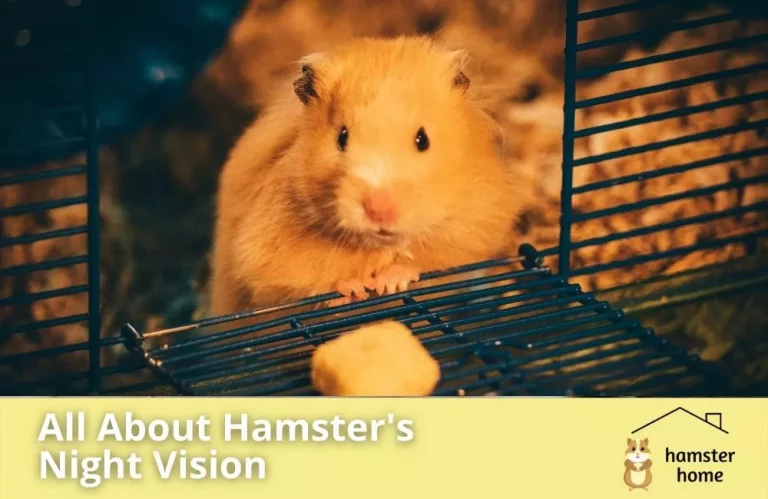As these little furballs are more active at night, hamsters owners usually wonder, Can hamsters see in the dark?
When hamsters are born, they are blind. With time, they start developing eyesight. Even the fully developed eyesight of a hamster is not good enough to see things clearly after a few inches meaning they are short-sighted. However, hamsters can indeed see better at night compared to their daytime vision.
As a hamster owner, you will be well aware that hamsters are more active at night naturally. All of this is because they are prey animals. They have developed such a nature to minimize their interactions with the predators in the wild.
Although domesticated hamsters are far from the wild, they still hold their basic survival instincts.
Hamsters As Nocturnal Animals
To be precise, hamsters are originally crepuscular animals. Particularly in the wild, hamsters usually feel safe to spend their time in the self-dug caves. Hamsters are prey animals, and to avoid any exposure from predators, they prevent roaming above the surface in the bright daylight.
To get a look at this beautiful world, they come out from their dens at dusk or dawn.
Contrarily, domestic or captivated hamsters are not in a wild environment, so their risk of being preyed on is eliminated. This made the domestic hamsters evolve in a way to be nocturnal. Pet hamsters are active at night, typically after 11 pm, to enjoy their day. Yes, our night is like their daytime.
Can Hamsters See in The Dark?
The short answer to this question is yes, but to an extent! Being nocturnal, these hamsters are more energetic at night. They can have a better vision than daylight, but it’s not more than a few inches.
They are genetically short-sighted rodents. They have the clearest vision at dawn and dusk time.
How Can Hamsters See Better in The Dark?
As mentioned, hamsters can see better in the dark than in daylight. The logic comes from the natural eye characteristics of nocturnal animals.
The eye of any individual, whether it’s a human or animal, contains a set of cones and rods. Cones are photoreceptor cells that allow bright light to fall into the retinas, and that’s the reason we can witness this beautiful world in daylight.
Contrary to this, rods are responsible for maintaining a balanced vision at night.
As for the nocturnal animals, they have more rod cells than cones.
So, they aren’t good at visualizing their surroundings during the day as the bright light can’t be projected on the retina.
Similarly, as hamsters are nocturnal rodents, they can’t see during the daytime, and you will witness them venture around mostly during the night.
Are Hamsters Short-Sighted?
Yes! Hamsters are born blind, and when they reach adulthood, they are typically short-sighted. They cannot have a clear knack for the surrounding things at a distance from them.
However, to compensate for these drawbacks, hamsters have a brilliant smelling and listening mechanism. They can smell very well through their vicinity, and the eyesight problems always sit behind their incredible listening and smelling capability.
Now, if hamsters are short-sighted, how come they recognize their owners? As a responsible hamster owner, you must know the answer to this important question.
How Does a Hamster See Humans or Recognize its Owners?
Hamsters are near-sighted, and you might have to pick your hammy close to your nose to give him a look at your face, but this action might cause an apocalypse from the rodent. Hamsters are very active creatures and can sense their surroundings using their nose and paper-thin flappy ears. Hence hamsters use their senses of smell and hearing to recognize their owners.
Try to spend more time socializing with your furry partner and use a soft voice to call hamsters. Hamsters have sensitive ears, and loud noise can hamper their hearing system.
How Do Hamsters Survive Without Having Good Eyesight?
Indeed, eyesight is one of the best senses of all, but it’s not the only one. Hamsters do almost all their wheel exercises eating food and venturing around your house utilizing their excellent sense of smell and hearing.
Furthermore, the sharpened teeth and claws must not be put aside in assisting these hamsters in digging holes or dens for them.
Let’s shed some light on these incredible efficiencies of hamsters.
Hearing
Hamsters are very good at hearing. They can hear those sounds which might not be audible to humans.
You might have witnessed your hamster standing on his feet and looking in a particular direction. That’s a sign that they have heard something that you might have not!
The hearing ability enables hamsters to detect the surrounding movements and recognize their owners. While in the wild, their thin yet effective ears help them process any predator’s presence.
Smelling
Hamsters are also blessed with brilliant smelling capabilities. Their excellent and small nose enables them to roam around their cages and smell their favorite foods and drinks. These incredible smell powers help the hamsters to detect other same species.
The scent glands present on hamsters’ hips play a crucial role. Hamsters rub them against a surface to mark their territory, and when there is a mating season, hamsters can smell female partners.
Furthermore, their nose assists them in digging dens in the ground and confronting any presence of predators around their vicinity.
Teeth And Claws
One of the essential aspects of rodents is their sharp teeth and claws. Although hamsters are short-sighted, their survival is mainly based on their teeth and claws.
Hamsters use their teeth and claws simultaneously to dig holes in the ground and escape a predator. Moreover, these teeth also serve as a great defense mechanism against predators.
Try poking your hamster when he is asleep, and you will get the idea of how they use their teeth for defense.
Should Hamsters Be Forced To Stay Awake At Day?
A hamster’s life cycle works by rising at around 11 pm and going to bed when the sun’s bright light interprets their vision.
We, humans, are the complete opposite!
Some pet owners want their hamsters to play and enjoy during the daytime when most hamsters are having a peaceful sleep. This puts a lot of stress on the hamsters.
As hamsters are nocturnal, they spend their night energizing and venturing around to release the build-in energy, and as the sun shines, hamsters go to bed as they are completely worn out.
They need to relax to stabilize their health.
When hamsters are forced to stay awake during the daytime, their natural clock is disturbed. The brain of the hamster does not appreciate such sudden changes. Most of the hamsters might get a physiological change and can get a lot of depression.
Your hamster might be biting the cage and acting tired. This can be one of the possible reasons that he is not getting adequate sleep.
Similarly, altering their active phase can also hinder your hamsters from paying off and releasing their energy. Many pet owners go to bed late and turn off their lights late. The hamsters don’t get enough of their time roaming around and experience some serious boredom.
What’s the Solution?
Never wake your hamsters during the day. They can sometimes wake in the day, eat some of the food or drink some water, but that’s not the sign that they are playful and habitual of nightlife and love to sleep lately.
Don’t let your hamster suffer, put the cage in a separate room and turn off the lights.
How to Watch Your Hamsters At Night?
This is particularly the most exciting question. Many pet owners desire to witness a knack of their hamsters enjoying movements and roaming around the house.
But they also don’t want to turn on the bright lights as they can harm the hamster’s eyes. So, what can you do, how to watch your hamsters during the night?
As discussed, hamsters have clearer vision during dusk and dawn time, and this is where they spend their quality time rolling around the spinning wheels and exploring different parts of the house.
Try to mimic the dusk and the dawn time. Most lamps come in a pleasant yellowish light, much like dusk and dawn.
So, turn on your lamp and put it some distance away from your hamster’s cage. And visualize your hammy playing here and there.
Conclusion – All About Hamster’s Nightlife
Hamsters can see in the dark but to a specific distance. Their nocturnal nature and the presence of numerous rods make them visualize more surroundings than in the daytime.
However, their unique sense and hearing organs are good companions and hold a much bigger credit to assist their natural lives. In this post, we have covered all that will help you understand your hamster’s behavior in the dark. Moreover, now you know the perfect solutions for handling your hamster in the dark.







